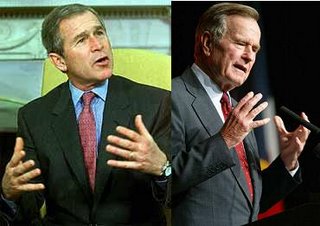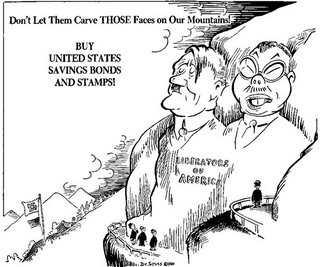Saturday, April 08, 2006
I agree with the Pentagon's decision to censor the media during the Gulf War. In this reading the author talks about how the Pentagon censored the media during the war. The Pentagon controlled everything from which American units can be visited by reporters, how long a visit will last, which reporters can make the visit and what the reporters may say. What the television can show and what can be written. The Pentagon also looked closely at media coverage and made sure that the coverage was in the favor of what the Pentagon wanted. The Pentagon also black balled many reporters who asked hard, difficult questions concerning the war. Sometimes though the military spoke freely about themselves when feeling like it. The Pentagon felt most concerned about television coverage. "On camera" interviews were done because the military didn't like what was being portrayed. Other times the military staged events for the television cameras this was done to make sure the Pentagon got in what they wanted to get in. In the Gulf War the Pentagon put together the pool system. This was a system that grouped reporters in small bands or pools by the Pentagon and were sent around in guided tours specifically created by the Pentagon. The reporters that weren't in the pools were sought of left out in Saudi Arabia. They had relatively no knowledge of what was going on. The pool system was a good system for a short war but not a long one. Mainly because after a while the reporters would break away from the pools and venture out on their own. The pool system was put together to have some sort of control over the media and not allow another Vietnam from happening. Where the society held protest and anti-war rallies against the war.
Friday, April 07, 2006
Second front
In chapter, one of second front Macarthur speaks of many different topics the one topic that stands out for me is the pool system. It was very interesting how only a certain number of reporters would go into the field, gather information, and bring it back to the rest of the reporters. This probably did save a lot of money and injuries for the reporters and the networks but it seems to me that this not a good way to get stories. All the reporters are reporting the same stories. Therefore, the public itself is not getting different aspect of the news from different people but the same news from every one. So if one person has the wrong information so does everyone else. It is a horrible way to get the news to the public.
Pentagon Restrictions
What i found most interesting is on the Pentagon guided tours the Pentagon only agve access to reporters assinged to pools. Most of all they had to be escorted. I think with tihs restriction reporters where not able to report indepndtly, and did not get all access.
Thursday, April 06, 2006
The pool system
The pool system was invented by the government to limit the information that the publics gets of the war. The media has to obey what the army tells them to do with the information that they were able to get. The army takes that media to see that which will show the army in a good way as well as the war. We as media watcher look up to the media to tell us what is happening in the war. The truth is that what we watch in the news is controlled by people that would only show the good side of the war never the bad side of it.
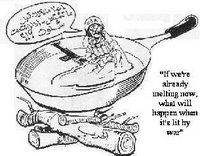
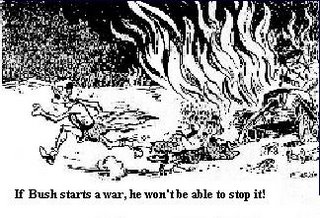
Propaganda was also used by the Iraqis during the Gulf War . Saddam used political cartoons such as these to spread nationalism amongst the people of Iraq . In the political cartoons, it illustrates that if Bush Sr. started this war he would not have the power to stop it .
As quoted from psywarrior.com "In addition to using propaganda to control and motivate the citizens of Iraq. Saddam has found willing listeners among other Arab nations. Using the themes of Arab nationalism, religion and morality he continues to work at gathering support while at the same time urging his listeners to disrupt and destroy the support that other Arab countries are giving to U.S. Actions". This site also explains how propaganda was used to portray the Americans as the enemy
"Iraqi propaganda appeals to the basic elements that are common throughout Iraq and other Arab countries - nationalism, religion, and morality. Utilizing those elements as a base, the Iraqi propaganda machine makes every effort to depict the United States as an enemy that is opposed to all that is good and sacred. The resulting portrait of America is not a pretty picture to Arab eyes. "
Hotel Warrior : The Pools
" The system had taken months of negotiations between the Pentagon and Washington bureau chiefs attempting to ensure fair access to the battlefield. It had been subverted with an imperial handshake." (pg.34) Is fair though defined as, writing what you see or writing what you think the military will find acceptable. The fear was that if you did write negative information you would not be given a chance to write further stories, let alone have an interview with General Schwarzkopf. Also the pool system had pools within itself, from the largest one such as the print pool to the smallest one being the radio pool.
Then we have the problem of not what you know but who you know in the case of Mr. Galloway, where General Schwarzkopf " ordered that a slot be quietly created " (pg.34) for him. To Mr. Galloway's credit " he was one of the few reporters set to Saudi Arabia with prior combat experience" (pg. 33). One reason for his being accepted and getting his work completed quicker than others was because his stories were always positive in nature with regards to the military.
Then we have the problem of not what you know but who you know in the case of Mr. Galloway, where General Schwarzkopf " ordered that a slot be quietly created " (pg.34) for him. To Mr. Galloway's credit " he was one of the few reporters set to Saudi Arabia with prior combat experience" (pg. 33). One reason for his being accepted and getting his work completed quicker than others was because his stories were always positive in nature with regards to the military.
Wednesday, April 05, 2006
More Viewing, Less Knowledge
"More Viewing, Less Knowledge" is written by Michael Morgan, Justin Lewis, and Sut Jhally talks how popular the medias role in the Persian Gulf War was. The passage continues by saying that the public was fooled by media because only "good" news was reported instead of all the news of the war, and that the media were more like "cheerleaders" for the war rather then giving a nonbais look on the war.
This was one of the most watch television events of the time period and most watch war ever. One of the reasons the war was so popular was that there were defined "good" and "bad" guys in America and Iraq respectively. The authors didn't know if the more the public watched, if they would learn more about the war. To see if the public learned they conducted a survey. First they discovered most Americans supported President Bush, therefore, they supported his need for the war and some Americans said they would even pay higher taxes. Other then President Bush, most Americans could not name any of the other major players in the war besides Saddam. The survey in the end showed that the more television the public watched of the war, the more they supported it. Therefore, the less television they watched the less supportive they were. They also discovered that the less education the public had, the more they supported the war in Iraq.
In conclusion, it seems many Americans were fooled by the medias roll of the war. They made it seem like America had no other motives besides freedom. I completely agree with the authors of this chapter and strongly believe if more of the dark side of the war was shown on television, the less support the American public would of had. The public basically just repeated what they were told and weren't thinking for themselves.
This was one of the most watch television events of the time period and most watch war ever. One of the reasons the war was so popular was that there were defined "good" and "bad" guys in America and Iraq respectively. The authors didn't know if the more the public watched, if they would learn more about the war. To see if the public learned they conducted a survey. First they discovered most Americans supported President Bush, therefore, they supported his need for the war and some Americans said they would even pay higher taxes. Other then President Bush, most Americans could not name any of the other major players in the war besides Saddam. The survey in the end showed that the more television the public watched of the war, the more they supported it. Therefore, the less television they watched the less supportive they were. They also discovered that the less education the public had, the more they supported the war in Iraq.
In conclusion, it seems many Americans were fooled by the medias roll of the war. They made it seem like America had no other motives besides freedom. I completely agree with the authors of this chapter and strongly believe if more of the dark side of the war was shown on television, the less support the American public would of had. The public basically just repeated what they were told and weren't thinking for themselves.
The Second Front, an interesting paragraph
"The president personility made the decision to deploy a pool of reporters to cover just cause with the agreement of the Secretary of Defense and the chair men of the Joint Chiefs of staff. Thier decision should dispel the fear that the media pool would never be used in actual combat. Every decision that we made during just cause was intenmded to facilitate open, timely media coverage of the operation", (Williams) This comment to me in a way gets me angered because its such a blatent lie. What they did prevent in this instance was coverage of El Chorrillo, which is a extremly poor area where General Manuel Noriega was. It was his head quarters and when it was attacked many innocent civilians were killed. there were over 300 hundred people killed and many were buried alive in thier own houses. This was truely a catastrophy, and a sad mishap. but once again the military was able to cover up this terrible accedint. The military covers this horrible accedent in a very timely fashion not to ruin the mission. The truth will come out down the line but its almost irrelevent. This is where im indifferent i believe that in a democracy we should have the right to know about these mistakes made , and these are human beings we cant just forget about them. But yet from a military perspective it could ruin the mission.
Hotel Warriors: The pools

To disseminate information to the media during the Gulf War, reporters were addressed by the military in groups. These groups or "pools" were filled with hundreds of reporters, and were totally dependant on information provided by the military. Most of these reporters wanted to get out in the field and report first hand, but there were only a limited number of spots. This resulted in infighting among reporters, each trying to get the scoop. As put by Fialka:
In essence, a pool means that all of the news products from the war be shared, but "beggar they neighbor" was often closer to the reality under which we operated.
This was exactly the envirement the military intended to create with the pool system. These conditions ensured that the news could be effectively managed by limiting access to sensative information, and steering "friendly" journalists to the limited pool positions.
Second Front
Second Front awakened my consciousness of how tightly controlled our news is. As a citizen, I find it disturbing that the 4th estate has in many ways been absorbed into the govt institution by way of those who own and control the media, ie ruppert murdock etc...As a PR specialist, though I'm ok with it, because these are the wheels that need to be turned in order to make things happen
Tuesday, April 04, 2006
The importance of air wars
One key thing that is discussed both in Second Front as well as in our class is the topic of air wars. This was probably the most important phase of the Gulf War. In desert storm, the air war began on January 15, 1991. This air war was very high tech and devastaeing to the enemy. The importance of air wars and the reasoning behind them was that they were a bit safer and less of our soliders would die. Therefore the US can attack and have nearly no casualties. No casualties gives the media nothing to report. This is important from the media perspective because Americans would see less soldiers dying. An air wars allows the military to take complete control of the airspace. Only after this is accomplished does the ground war begin. However, the air war should go on as long as possible. Once ground troops are brought in the war is automatically open to scrutiny.
War--popular cullture?
"Popular culture --The opposite of high cultural art forms, such as the opera, historic art, classical music, traditional theater or literature; popular culture includes many forms of cultural communication including newspapers, television, advertising, comics, pop music, radio, cheap novels, movies, jazz, etc. In the beginning of the 20th Century, "high art" was the realm of the wealthy and educated classes while popular culture or "low art" was considered commercial entertainment for the lower classes. In the 1950s and 60s the gulf between high and low art closed with the rise of Pop Art." (http://www.artsconnected.org/artsnetmn/identity/idvocab.html)
When we talk about war, we can't neglect the huge propaganda project which combines almost all medium forms that are also elements of pop culture. meanwhile, war attracts national or even global acceptance or at least attention the whole way long. For this sense, war can be defined as popular culture. but they are definitely more complicated and sophisticated than we usually think pop culture will be, because the way towards this destination--propaganda asva scientific system plays such an crucial role. And, its cost and possible potential profit can be extraodinary.
For the home front, viewing human devastation as populaer entertainment becomes real in war time. and "the so-called war potato thus seems to be the perfect example of the cultural dupe who is brainwashed by a medium that follows the White House public relations agenda."
War makes people stupid because it encourages people to minimize the independent thought and action central to a democracy. (Couch Potatoes Aren't Dupes, Constance Penley and Andrew Ross) since government controls the whole access to information, therefore, public perception on war can only be within the framework and mold that are already preset by the government. and the rhetoric of the governmemt makes people feel especially closely related to the war itself. war becomes a kind of brand that actually people participate symbolically in it. all the products they produce or consume are all with the label of this world famous brand name. war earns the winning part tremenous market that can function well under energetic political economy system.
When we talk about war, we can't neglect the huge propaganda project which combines almost all medium forms that are also elements of pop culture. meanwhile, war attracts national or even global acceptance or at least attention the whole way long. For this sense, war can be defined as popular culture. but they are definitely more complicated and sophisticated than we usually think pop culture will be, because the way towards this destination--propaganda asva scientific system plays such an crucial role. And, its cost and possible potential profit can be extraodinary.
For the home front, viewing human devastation as populaer entertainment becomes real in war time. and "the so-called war potato thus seems to be the perfect example of the cultural dupe who is brainwashed by a medium that follows the White House public relations agenda."
War makes people stupid because it encourages people to minimize the independent thought and action central to a democracy. (Couch Potatoes Aren't Dupes, Constance Penley and Andrew Ross) since government controls the whole access to information, therefore, public perception on war can only be within the framework and mold that are already preset by the government. and the rhetoric of the governmemt makes people feel especially closely related to the war itself. war becomes a kind of brand that actually people participate symbolically in it. all the products they produce or consume are all with the label of this world famous brand name. war earns the winning part tremenous market that can function well under energetic political economy system.
Monday, April 03, 2006
Is Controlling the Media a Bush Trait?
In Manipulating Hearts and Minds, Schiller writes: "the United States, with its enormous media system operating with state-of-the-art technologies, has been as closed as a society could be to information, facts, and opinion which in the slightest challenged the national war policy...the Bush Administration and the military were so successful in controlling information about the war they were able to tell the public just about what they wanted the public to know."
It seems like both former President Bush and President George W Bush (and their Administrations) have a great skill in only letting the media know what they want it to. Have other presidents been so successful in controling the media? Have they realized from past blunders during other conflicts that the media would be an important thing to have a handle on, and therefore honed their skills early?
It seems like both former President Bush and President George W Bush (and their Administrations) have a great skill in only letting the media know what they want it to. Have other presidents been so successful in controling the media? Have they realized from past blunders during other conflicts that the media would be an important thing to have a handle on, and therefore honed their skills early?
WomenatWorkII (WWII)

Dorothy Ducas
Magazine Division
Office of War Information
Social Security Building
Washington D.C.
We see an interesting shift in the American perception of women during this period. Prier to the WWII the women’s place was found in the home. She was expected to cook, clean, and take care of the family. She was to do the laundry and keep the home intact, while the man went out providing for the family. However, as WWII began to take on momentum we see a different explanation of women within American society. That she was not only a housewife, but also much more. Much more? This was not the message that was being portrayed by American media and propaganda prier war why now? Because war had pursued and it was time for women to show men what they were really made of. I believe a tool that helped American propaganda in aiding them to gain the support of women was using the feminist movement. “And it’s time her husband begins to understand it, too!” This statement in the magazine war guide raises the brow of women all over the USA. That yes, it was time the “men” began to see it and recognize that women are capable of anything. “ Women will fill the shoes of any men who have left those occupations which are necessary to the life and well being of the civilian population are doing war work just as surely as if they donned military uniform or factory overalls.” There were pictures of women being posted all over doing men’s jobs and in some cases even doing better jobs. A representative of this movement was “Rose the Riveter,” a beautiful strapping young women with her sleeves rolled up, hair in a bun, flexing her muscle yet gleaming with beauty. This was the portrayed that the propagandist painted for the American women. It was also time, that not only their position was being liberated, but their pockets too. The new job openings and fill-ins gave women the opportunity to make the same money that men had been making. This was huge for many women. Lastly, another tactic of the propagandist was to make sure the women were aware that they were fighting this war too. “ Women at Work on the Home Front,” This headline shows the importance of women in their new roles. That they were important to the success of the war, that if they didn’t do their jobs at home there soldiers, husbands, fathers, and sons would be lost in war. That every piece of metal the welded and every food drive they organized helped bring their boys home. “The more women at work, the sooner we’ll win the war.”
George Creel
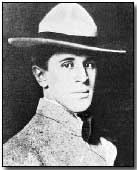
In the 1950's , George Creel headed the Committee of Public Opinion , during the World War 1 . He was involved in every aspect and tool of propaganda . He had authority over cartoons, media and print posters. Creel also put into effect " four minute men . These were men who volunteered to speak publicly for four minutes in support of the war . Creel combined advertising techniques and human psychology to influence the masses . With power over the media , George Creel is also accused of censoring material at this time
Loss from the Beginning
Generally referred as the first televised war, the frame of vietnam war was dramatically changed by the power of the mass media. Just as Marshall McLuhan said: “Television brought the brutality of war into the comfort of the living room. Vietnam was lost in the living rooms of America--not on the battlefields of Vietnam." In Vietnam, the government lost the battle of controlling the media at the first step.
Similar mistake repeats itself several decades later. however, this time the media lost the game at the very beginning. By consenting to join the pool system, they were doomed to failure. On the one hand, they found themselves couldn't get rid of the confinement of the pool and sought the lifeboat for objectivity under severe censorship of the Pentagon. This was a censorship conducted by restricting access and banning all reports that are regarded to have negative effect on the home front audience who can only be reached by clean and holy message. Unilateral coverage was not allowed and hardly few could afford it. meanwhile, their months' effort could be destroyed in a second by unexpected attack from all sources. media was in such a dilemma that on the other hand, they helplessly found themselves have to rely on the pool system to get information, more specifically, compete for information even within such a limited pool. Losing the trust of the Pentagon means losing the whole business. no wonder, whoever already involved didn't dare to try such a risky business trade. without resources, they can't get audiences from home front, then lose money, lose shareholders, and may fianlly be driven out of the whole market. the chain effect is horrifying and the government jumped on it and manipulated to the perfect extent that the whole war process was under control.
Similar mistake repeats itself several decades later. however, this time the media lost the game at the very beginning. By consenting to join the pool system, they were doomed to failure. On the one hand, they found themselves couldn't get rid of the confinement of the pool and sought the lifeboat for objectivity under severe censorship of the Pentagon. This was a censorship conducted by restricting access and banning all reports that are regarded to have negative effect on the home front audience who can only be reached by clean and holy message. Unilateral coverage was not allowed and hardly few could afford it. meanwhile, their months' effort could be destroyed in a second by unexpected attack from all sources. media was in such a dilemma that on the other hand, they helplessly found themselves have to rely on the pool system to get information, more specifically, compete for information even within such a limited pool. Losing the trust of the Pentagon means losing the whole business. no wonder, whoever already involved didn't dare to try such a risky business trade. without resources, they can't get audiences from home front, then lose money, lose shareholders, and may fianlly be driven out of the whole market. the chain effect is horrifying and the government jumped on it and manipulated to the perfect extent that the whole war process was under control.
Sunday, April 02, 2006
George Creel-I am public opinion
Creel persuaded the President to launch the Committee on Public Information. It was run by three cabinet members and Creel. They only met one time together and Creel listened to the cabinet member's advice and never spoke to them again. The Committee on Public Information was pretty much George Creel. The committee never touched censorship because censorship in the U.S. is something that is an unforced agreement managed and exercised by the press themselves. The goal of the Committee on Public Information was the creation of a desirous belief in the justice of America's cause that would force the American people into one white hot mass feeling with association, commitment, courage, and deathless determination. Creel believe in the war will. In a democracy, he kept that will depended upon the degree to which each one of all the people can focus and honor body, spirit, and soul in a extreme effort of service and sacrifice. Creel made the Four Minute Men. He made the volunteers make speeches about pro-war. They were on movie screens before the feature films saying that they are speaking for the Committee on Public Information and gave 4 minute speeches and threw in their own personal touch when they could. It was very successful and a more than a million men signed up without a protest.
Rosie The Riveter
Rosie the Riveter is one of six million women that worked in the manufacturing plants which made materials during WWII while the men were in the war. When we entered the war in 1941, life was changing for everyone. The factories were at a loss for workers because most of the men went to fight in the war and the men that stayed were completely tired from doing so much work. Because of this women were able to work in the factories. Women were always paid much less, and not everyone was getting the same wages. Rosie the Riveter opened up the workforce for women. After the war was over though, women were forced out of the work force and the jobs were given back to the men. Women still wanted to work in the factories, but they did not let them and when they were finally able to the factory employment as a whole was in a decline all over.
